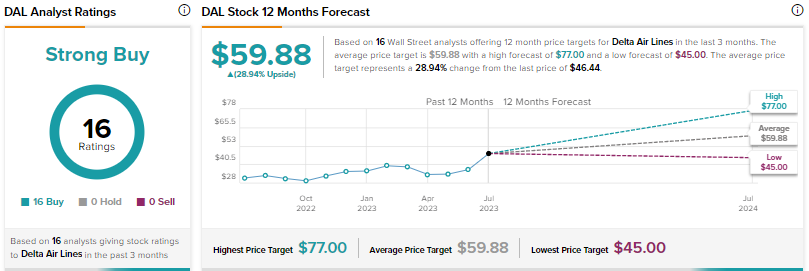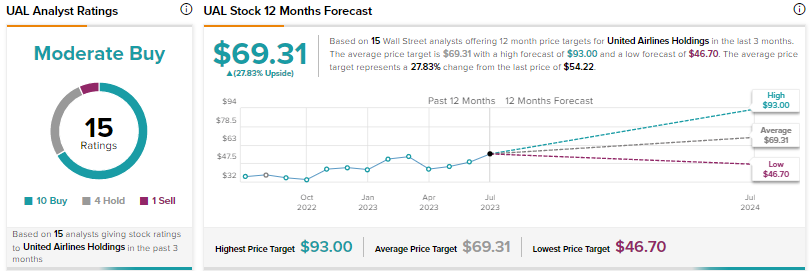Continued boom in travel demand has helped major airlines recover from the pandemic-induced slump, despite staff shortages and weather-related disruptions. Consumer spending on travel remains strong, defying inflation and economic pressures. Amid favorable travel trends, we used TipRanks’ Stock Comparison Tool to pit Delta Air Lines (NYSE:DAL), United Airlines (NASDAQ:UAL), and American Airlines (NASDAQ:AAL) against each other to find the airline stock that scores Wall Street’s Strong Buy consensus rating.
Elevate Your Investing Strategy:
- Take advantage of TipRanks Premium at 55% off! Unlock powerful investing tools, advanced data, and expert analyst insights to help you invest with confidence.

Delta Air Lines (NYSE:DAL)
Strong summer travel, especially international demand, and declining fuel prices drove a 13% year-over-year increase in Delta Air Lines’ Q2 operating revenue to $15.6 billion. Adjusted earnings per share (EPS) surged 86% to $2.68.
Delta expects its Q3 EPS in the range of $2.20 to $2.50 and revenue growth of 11% to 14%, backed by a 16% rise in capacity. The carrier also increased its full-year earnings guidance.
Additionally, Delta continues to strengthen its balance sheet and repaid $3 billion of debt in the first half of the year. It expects to accelerate its debt repayment plan, with a goal of repaying over $4 billion in gross debt in 2023.
Overall, Delta believes that it is well positioned to achieve its 2024 EPS target of over $7. It also expects to generate free cash flow of more than $10 billion from 2023 to 2025.
Last week, Bank of America analyst Andrew Didora increased the price target for Delta Air Lines to $53 from $50 and maintained a Buy rating on the stock.
Didora noted that the company’s solid Q3 revenue growth guidance range came ahead of his 10% estimate. The analyst raised his Q3 revenue and EPS estimates to the midpoint and high end of the company’s guidance ranges, respectively, given robust summer leisure demand.
Is DAL a Good Stock to Buy Now?
Wall Street’s Strong Buy consensus rating on Delta Air Lines stock is based on 16 unanimous Buys. The average price target of $59.88 implies 29% upside potential. Shares have rallied over 41% year-to-date.

United Airlines (NASDAQ:UAL)
United Airlines’ operating revenue increased 17% year-over-year to $14.2 billion in Q2 2023, with a 44% rise in international passenger revenue. Adjusted EPS jumped to $5.03 from $1.43 in the prior-year quarter, driven by higher revenue and lower-than-anticipated fuel prices. United delivered impressive results despite weather-related disruption in late June at its Newark hub, which led to thousands of flight cancellations.
For the third quarter, United expects revenue to rise 10% to 13%, with capacity expected to increase about 16%. In particular, the company anticipates demand to be robust in September and October compared to both 2019 and July and August levels. Further, it projects international business to continue to fare better than domestic business in the third quarter across the globe, other than Latin America.
The company continues to bolster its financial position. Its adjusted net debt is down about $3 billion since the end of 2022 and $6 billion since the end of 2021.
Following the Q2 print, Raymond James analyst Savanthi Syth raised her price target for United Airlines to $76 from $72 and reiterated a Buy rating on the stock.
Syth thinks that United is likely to fare better than most U.S. rivals in the medium-term due to its outsized exposure to large corporate and international travel. Syth also expects United to gain from the rapid growth in its premium offering.
Is United Airlines a Buy, Sell, or Hold?
Wall Street is cautiously optimistic on United Airlines stock, with a Moderate Buy consensus rating based on 10 Buys, four Holds, and one Sell. The average price target of $69.31 implies an upside of nearly 28%. Shares have risen 44% since the start of this year.

American Airlines (NASDAQ:AAL)
Like Delta and United, American Airlines benefited from the travel boom and crushed analysts’ Q2 expectations. The company’s Q2 operating revenue increased 4.7% to $14 billion, while adjusted EPS surged 153% to $1.92. Despite strong second-quarter results and full-year earnings guidance upgrade, shares fell following the results as investors appeared unimpressed with the Q3 outlook relative to the peer group.
On the positive side, American Airlines has reduced its total debt by about $9.4 billion (including $387 million in Q2 2023) from peak levels in 2021. It aims to bring down its total debt by $15 billion by the end of 2025.
Following last week’s results, Bank of America’s Andrew Didora reiterated a Sell rating on AAL shares with a price target of $11. The analyst believes that AAL’s smaller international presence and tougher domestic comparisons are keeping its top-line growth below its rivals.
Didora also highlighted American Airlines’ elevated leverage compared to its peers. He sees a long road ahead for the company to improve its balance sheet coming out of the pandemic, with management focused on gross debt reduction instead of net debt.
What is the Prediction for American Airlines Stock?
Wall Street is sidelined on American Airlines, with a Hold consensus rating based on two Buys, seven Holds, and two Sells. The average price target of $19.17 implies 15.1% upside. Shares have risen about 31% so far in 2023.

Conclusion
Of the three airline stocks discussed above, Wall Street is highly bullish on Delta Air Lines, although the upside potential from DAL and UAL stocks is comparable. Like analysts, hedge funds are also bullish on DAL. As per TipRanks’ Hedge Fund Trading Activity Tool, hedge funds increased their DAL holdings by 1.3 million shares last quarter, resulting in a Very Positive Hedge Fund Confidence Signal on the stock.
What’s more, according to TipRanks’ Smart Score System, DAL scores a “Perfect 10,” implying the stock could outperform the broader market over the long term.
















